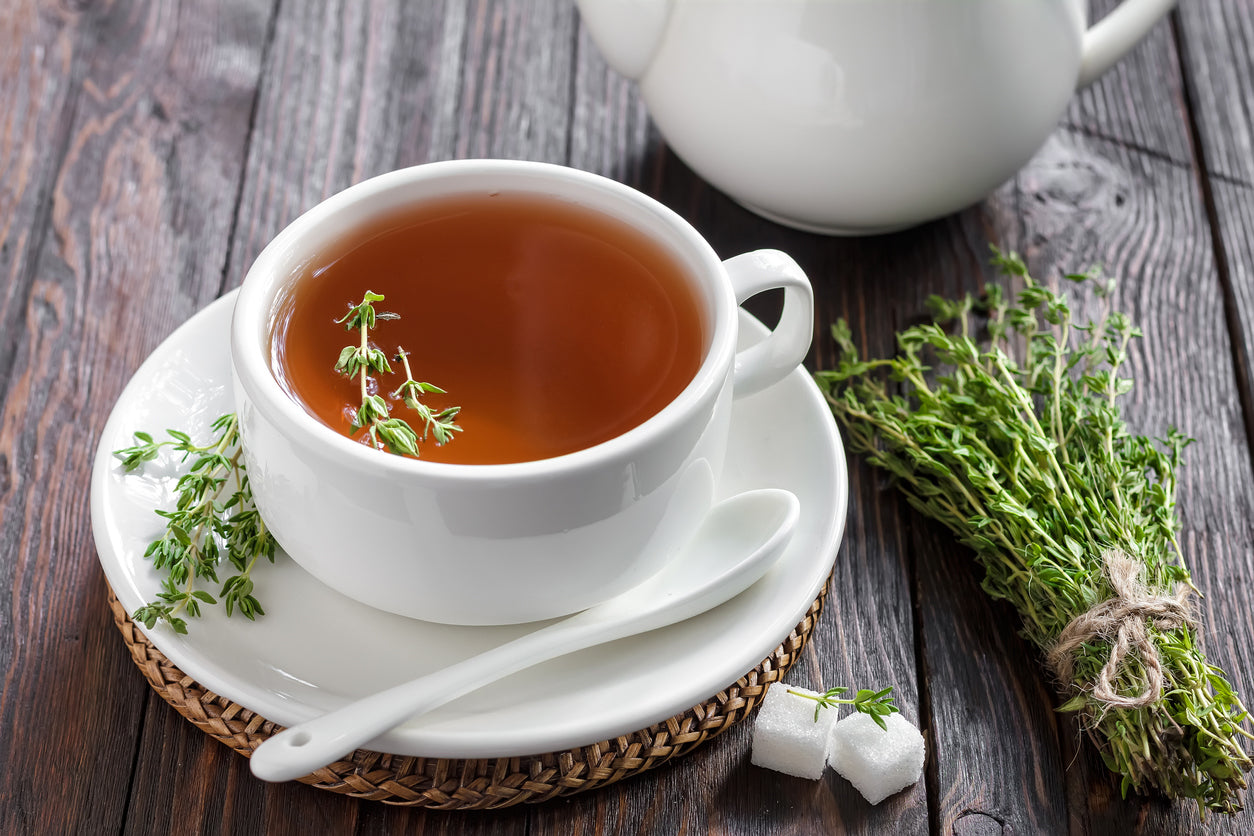Improve your blood pressure, memory and mental outlook on life with a flavorful spice

Natural healers have traditionally used thyme to treat sore throats, coughs and skin irritations. Throughout the ages, people have turned to thyme for emotional support as well. Warriors in ancient Greece were given thyme to impart courage and resolve, while in the Middle Ages the herb was placed under pillows to promote restful sleep and banish nightmares.
Centuries later, contemporary medical research confirms the benefits of thyme, supporting the ability of thyme extracts to lower blood pressure, reduce anxiety and brighten mood.
Protect yourself against neurodegenerative conditions, while improving mood and cognitive function
Thyme, botanically known as Thymus vulgaris, is used both medicinally and in cooking, where it is valued for its piquant, piney flavor. While both fresh and dried thyme leaves can confer health benefits, essential oil of thyme offers much higher concentrations of disease-fighting antioxidant compounds - including thymol (which comprises 20 to 54 percent of the essential oil), pinene, linalool and carvacrol. Noteworthy flavonoids in thyme and thyme oil include apigenin, naringenin and luteolin.
These antioxidants help to neutralize harmful free radicals that contribute to chronic disease. And, researchers think they may also act against Alzheimer’s disease and dementia.
An animal study published in the British Journal of Nutrition attested to thyme oil’s powerful antioxidant capabilities - and revealed that it can help protect the brain from neurodegeneration and stress.
Researchers found that thyme improved brain function in elderly rats - all of which had suffered sharp age-related decreases in natural protective antioxidants such as superoxide dismutase and glutathione. While clinical studies are needed, this is an encouraging finding.
And, there was more good news - it appears that thyme extracts can function as a mild natural antidepressant. In a 2013 study, carvacrol in thyme affected neuron activity and increased levels of the “feel-good” chemicals serotonin and dopamine. The scientists noted that this can help boost feelings of well-being and decrease anxiety.
Thyme can help to protect the heart
Thyme extracts have been shown to increase circulation, leading to lower risk of heart attack and stroke. Constituents in thyme also promote vasodilation, meaning they can relax arteries and veins to lower elevated blood pressure. In addition, thyme has tonic effects on the heart to help strengthen cardiac muscles.
One animal study published in Acta Poloniae Pharmaceutica, a leading drug research journal, showed that thyme extracts could reduce both systolic and diastolic blood pressure, while lowering heart rate. In addition, thyme may cut levels of unhealthy LDL cholesterol and serum triglycerides (fats in the blood) while increasing beneficial HDL cholesterol.
Lowering these assorted risk factors translates to better cardiac health and establishes thyme as a potential weapon against heart disease, the Number One cause of mortality in the United States.
(Not bad for a common kitchen spice and garden herb!)
Discover a natural way to reduce the risk of respiratory infections and coughs
Do you have a nagging cough, courtesy of an upper respiratory infection? Thyme acts as a “triple threat” against colds, coughs and infections: it can alleviate congestion, has antispasmodic effects that may help relax airway muscles, and is naturally antimicrobial - meaning it inhibits pathogenic bacteria, fungi and viruses. In fact, one 2011 laboratory study showed that thyme oil had the ability to deactivate over 120 different strains of bacteria - some of which were drug-resistant!
In fact, thymol from thyme is effective against bacteria that cause plaque and dental decay – and can be found in commercial mouthwashes and toothpaste.
In one double-blind, placebo-controlled study involving 361 patients with acute bronchitis, a syrup made from thyme and ivy leaves helped to dramatically alleviate coughing. At the beginning of the study, participants were experiencing up to 10 coughing fits a day - and ranked at 5 points and over in the Bronchitis Severity Score, a recognized tool for measuring symptoms. By study’s end, the researchers report that the thyme/ivy mixture caused a 50 percent reduction in coughing fits, when compared to placebo - with no serious adverse effects.
Enhance recipes with the intriguing, delicate taste of thyme
It’s worth noting: thyme is an important spice in the Mediterranean diet, which is winning kudos from nutritionists and researchers for its heart-healthy properties.
Incorporate thyme into your diet by including the small, tender leaves - or even whole sprigs - in recipes for beef, poultry, fish and lamb. A close cousin to oregano, thyme can be used in much the same way to add “zip” to pizza, wraps and sandwiches. You can also use thyme to elevate mixed green salads and enliven soups and omelets. Or, brew it into a soothing tea. And, remember: thyme makes an excellent, heart-healthy salt substitute.
To use thyme essential oil, dilute it half-and-half with a carrier oil (such as olive oil) and dab a few drops on the skin or add it to bath water. You can also obtain the benefits of thyme oil by inhaling the fumes via an aromatherapy diffuser. Like other essential oils, thyme essential oil is not to be taken internally.
Of course, we suggest you talk to your holistic doctor before using thyme oil.
If you are feeling particularly stressed out lately, it might be time for some herbal help. And, thyme may be just the thing for offering some much-needed relief.
Sources for this article include:






